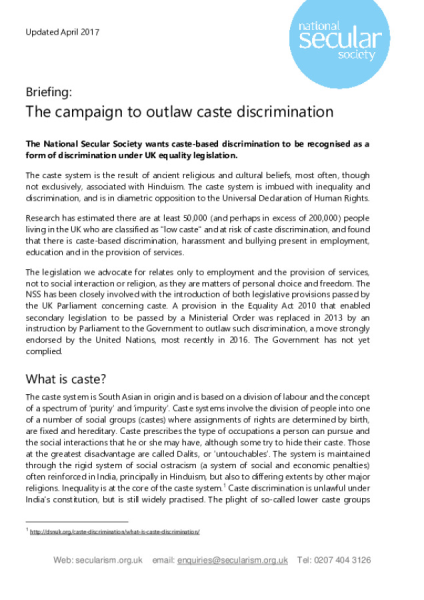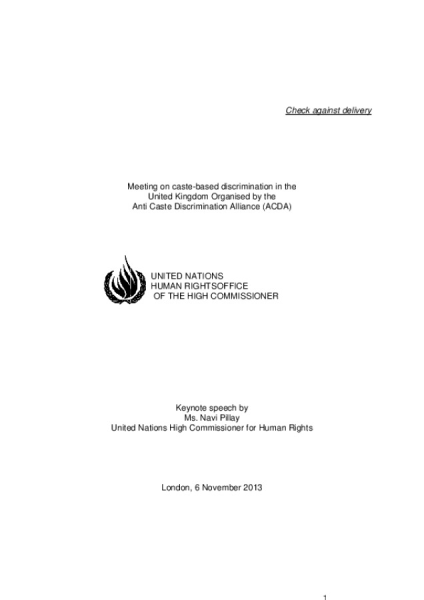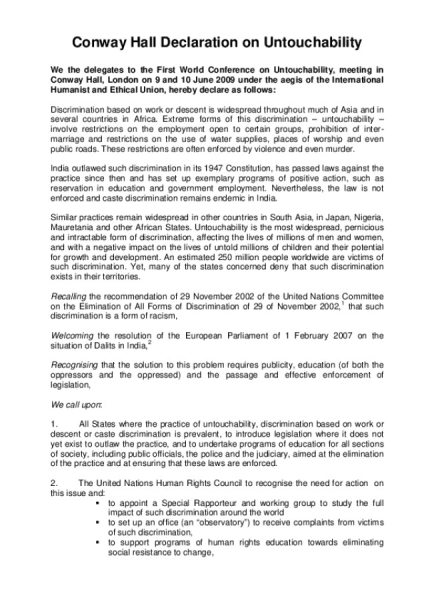
Outlaw 'caste' discrimination
Caste-based prejudice should have no place in modern Britain. We want to see caste-based discrimination explicitly recognised as a form of discrimination under UK equality legislation.
What's the problem?
The caste system is the result of ancient religious and cultural beliefs, most often, though not exclusively, associated with Hinduism. The caste system is imbued with inequality and discrimination, and is in diametric opposition to the Universal Declaration of Human Rights.
Research has estimated there are at least 50,000 (and perhaps in excess of 200,000) people living in the UK who are classified as "low caste" and at risk of caste discrimination, and found that there is caste-based discrimination, harassment and bullying present in employment, education and in the provision of services.
The Equality Act does not explicitly deal with the issue of caste, meaning victims of caste discrimination currently have to use unclear and precarious case law to secure justice. An express provision in the Equality Act 2010 would remove any legal uncertainty. Both Parliament and the United Nation Human Rights Council have called on the Government to explicitly outlaw caste-based discrimination, but it has delayed doing so for years.
In April 2017 the Government announced a long awaited public consultation on the issue of caste and the Equality Act 2010. This provides an opportunity to again press the Government to do the right thing and explicitly outlaw caste-based discrimination.
Find out more
Related news
UK government criticised for stalling on caste discrimination
Posted: Wed, 11 Mar 2015 14:40
The Government has been criticised for not taking action to tackle caste-based discrimination after a long campaign by anti-caste campaigners to have it specifically recognised under anti-discrimination laws.
Baroness Garden of Frognal has written to NSS honorary associate Lord Avebury, stating that the Government "have no plans to launch the consultation imminently, since it would not be appropriate to run public consultation of this sort in the period immediately before an Election."
In 2013 the Government undertook to "carry out a full public consultation on the prospective legislation in early 2014." Shortly after this guarantee, Lord Avebury warned that the Government was intentionally dragging out the process of dealing with caste-based discrimination until the General Election.
Now, Baroness Garden writes that "there is now no longer sufficient time in the current Parliament for public consultation of the appropriate length for this complex and controversial issue to be carried out."
The Government claims that a remedy for caste discrimination is already available under the Equality Act 2010. It has argued that an Employment Appeal Tribunal ruling made complaints about caste-based discrimination possible under the "ethnic origins" provision of the Equality Act. However in February 2015 Lord Avebury questioned this, and noted that the judgement in question "is not binding on all future cases of caste discrimination." Additionally, House of Commons research concluded that caste discrimination is currently unlawful only if "the circumstances of the case fall within the existing prohibition of race discrimination."
Peers were highly critical of the Government's handling of caste discrimination in February, and NSS honorary associate Lord Cashman described the Government's "procrastination" as "entirely unacceptable".
Research suggests that as many as 200,000 people in the UK may be affected by caste based discrimination.
Baroness Garden wrote that the Government has "always slated that we completely oppose caste discrimination and in that context we note that the judgment opens the possibility of legal remedy for claims of caste-associated discrimination under existing legislation".
The National Secular Society has argued that this remedy is at best partial, and that the Government has an obligation to enact secondary legislation tackling caste directly.
Keith Porteous Wood, NSS executive director, said: "The government has been directed to introduce anti-discrimination legislation by parliament and the UN. For it to defy both can only be explained by conflict with a strong vested interest.
"Victims of caste discrimination deserve much better and will rightly feel betrayed by the Government's failure to meet its obligations."
He added that the NSS would continue to lobby the new Government after May's General Election to ensure it takes the appropriate action.
Victory for campaigners as Government outlaws caste discrimination
Posted: Tue, 23 Apr 2013 11:20
The National Secular Society has welcomed news that the Government has climbed down following its defeat last night in the House of Lords and agreed to make discrimination on grounds of caste unlawful.
On Monday evening (22 April) peers voted to retain their original amendment making caste a protected characteristic (as an aspect of race) under equality law via a new clause in the Enterprise and Regulatory Reform Bill. The vote was won by 181 votes to 168.
The Government has now conceded on the principle and has tabled an amendment which requires the Secretary of State to bring forward regulations to include caste as an aspect of race (under Section 9(5) of the Equality Act).
Last week the Commons voted to reject the amendment by 64 votes. Earlier the peers had voted in favour of the amendment by 103 votes.
Keith Porteous Wood, executive director of the National Secular Society, commented: "We are delighted that the Government has committed to ensure that discrimination against caste will enjoy the same statutory protection as other protected characteristics. Too many British citizens have suffered caste based discrimination. Our equality legislation now sends out a clear signal that it will no longer be tolerated, and offers hope to the tens of thousands of British Asians whose lives are blighted by such prejudice.
"The 'Informal conciliation' solution previously proposed by the Government instead of legislation, possibly in deference to high caste (and high influence) Hindus, was woefully inadequate for such deep-seated discrimination that can ruin people's lives.
"We particularly regret the Government's refusal until today to follow the UN's recommendation (pdf) to bring in this legislation, especially as to do so was an international obligation.
"This is a victory for the Lords and their emphasis on protecting Human Rights. Special thanks go to Lord Avebury, Lord Harries of Pentregarth and Baroness Thornton for promoting this cause, which the National Secular Society has been campaigning on for several years since the first world Conference on Untouchability (pdf) in London in 2009.
It is thought the amended law will come into force within one to two years.
For further details on this issue, please see our briefing on caste discrimination (pdf).




